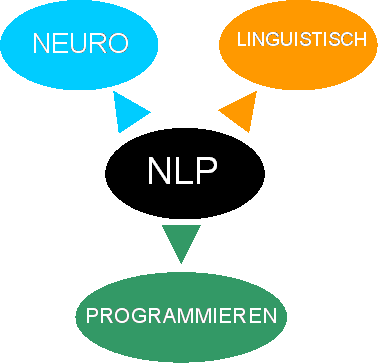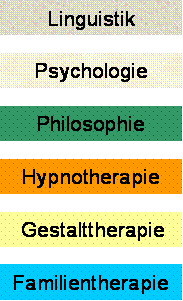Resources
Valuable resources are available for you – including NLP Practice Groups and NLP Library.
Lessons
» Welcome
Audio/Video Contributions
» Welcome
» What does NLP mean?
Text Articles
Brief description of NLP
Neuro-Linguistic Programming (NLP) is a model for communication and learning with a holistic view of humans.
It is the art of successful communication in professional and private life, personal development, and achieving one's best performance.
The NLP methods enable the expansion of the inner world of experience of humans and provide important resources for expression, communication, and cooperation.
NLP is fundamentally resource- and goal-oriented and assumes that every person carries all the abilities within themselves to achieve their goals well and solve their problems.
Components of NLP

Neuro: When we experience something with our senses – seeing, hearing, smelling, tasting, feeling – this is neurologically represented, processed, and stored in the brain and nervous system. This also includes fantasizing and remembering.
Linguistic: With our language, we encode our experiences. We communicate, explain, and organize our world through language. Symbols, gestures, and facial expressions are also included. We maintain external communication with others and internal communication with ourselves.
Programming: In NLP, we learn through meaningful, building experiences, not through trial and error. Change processes should be supported by targeted strategies, not based on chance.
Origins of NLP

Who is NLP useful for?
- For individuals in professions that involve a lot of communication
- For people who want to achieve their personal best in their professional lives
- For people who wish for a self-determined and conscious life
- For anyone wishing for more personal success and successful communication in their relationships
The methods and model of NLP work independently of the specific content. Therefore, communication processes can be integrated from almost all areas of life, such as in teaching for school children and adults, in respectful interactions with employees and team colleagues, and for personal self-management – to name just a few.
The following information is taken from the official NLP Guide of the DVNLP – German Association for Neuro-Linguistic Programming e.V.
Neuro-Linguistic Programming (NLP) describes – based on insights from modern systems theory, linguistics, neurophysiology, and psychology – the essential processes by which humans
- perceive themselves and their environment,
- process this information in their own way,
- act on this basis,
- communicate accordingly,
- learn and change.
People differ in the way they experience certain situations, themselves, other people, their relationships, their professional activities, and life in general. Depending on how we perceive ourselves and our environment at a given moment, how we think, what beliefs we have, how we feel, and how we evaluate these feelings, the same situation can be experienced as pleasant and beneficial or as difficult and burdensome.
Based on studies and models of human perception and information processing, NLP makes us aware of which factors govern our experience and how we create our experience ourselves. On this basis, a multitude of action models have emerged in recent decades.
The pragmatically oriented action models of NLP serve to improve interpersonal communication as well as personal development.
NLP is the discipline in the field of cognitive and behavioral sciences that is explicitly and comprehensively dedicated to the study of human subjectivity. With the insights gained, NLP simultaneously opens up – for individuals as well as for groups and organizations – efficient and flexible access to goal- and solution-oriented changes. Like any other scientific discipline, NLP continuously evolves through new research.
NLP training conveys a greater awareness of the processes that govern one's own experience. It teaches an expanded use of the five senses as well as the ability to formulate personal goals and realize them while considering influencing factors.
The knowledge developed worldwide in recent decades enables professional communicators – regardless of their content orientation – among other things:
- to refine their understanding of interpersonal communication processes,
- to adjust even more easily to the individual 'reality' of the other person – regardless of the methodological and content orientation of their own work,
- to significantly expand their flexibility in dealing with people from diverse backgrounds, and
- to flexibly face the challenges of a constantly changing world.
A question of perspective
When you inform yourself about NLP through the wealth of available literature or through conversations with NLP practitioners, you will find a variety of different descriptions. This diversity stems from the enormous range of the approach. Therefore, NLP will be illuminated from several perspectives below.
NLP is about communication
One of the fundamental principles of NLP states that we are always communicating. For the most part, we do this through language, but also through our facial expressions, gestures, tone of voice, etc. So what do we share, and how do we do this? Is what we want to convey also what the other person understands? If not, how do we recognize the corresponding cues, and how can we take them into account? NLP offers a variety of practical tools for efficient communication.
NLP is about language
Our use of language influences how we think and react. The process through which we translate our experience into language requires us to condense and distort our experience. We are forced to summarize in words how we perceive the world. In doing so, valuable information often gets lost for the other person.
NLP offers questioning techniques and patterns that help us shape communication with others and ourselves as we wish. NLP teaches us to understand how our use of language influences us through implicit and subtle assumptions. Language is full of pitfalls and traps. Knowing this helps you to avoid them.
For example, if you are asked not to think of a kangaroo, you will probably think of a kangaroo even more – the words achieve the opposite of what was intended! Or pay attention to the effect of implicit assumptions when you use the word 'but'. Here’s an example: 'I like how you did this work, but ...' The listener will often tend to forget everything that preceded the 'but' – expecting that problems will arise after this word.
Advertising professionals, media, politicians, and ideological groups of all kinds also deliberately use a specific language, to convey their messages and anchor them in the subconscious of their listeners. Through the knowledge conveyed in NLP about the effects of language, you can gain awareness of the influences that flow into you. In this way, NLP also serves as a kind of consumer protection for your mind.
NLP is about mental performance
NLP describes in an extraordinarily precise way the perceptions and mental processes, that create our personal reality: How do we know what we know? How do we do what we do? How do we make ourselves feel anxious at certain moments and happy at others? How is it that we like or dislike something? How do we learn something easily or not?
NLP offers us a manual for our brain – NLP models make it tangible how we 'code' our experience. When we understand how our brain makes distinctions, it becomes easier to change something, learn new things, and communicate efficiently.
NLP is about the study of subjective experience
Every person has their own style of perceiving the world, reacting to it, and learning from their experience. NLP is a tool that supports users in tuning into the individual and (sub)cultural peculiarities of people. NLP examines how our perceptual filters, thoughts, feelings, and actions interact to create our very own subjective experience.
It helps to understand how a person moves in their environment and how they explain the world. Precisely because NLP assumes that we do everything in different ways, it refrains from any schematized formulas. NLP shows how it is possible to perceive the uniqueness of the person, respect it, and thus respond to the individual. Therefore, it is an integral part of the fundamental attitude that NLP carries and from which it has emerged, to appreciate the differences between people.
Communication without borders – Areas for meaningful application of NLP
Wherever communication, the realization of one's potential, and efficiency are important, NLP can initiate fruitful developments. The more you are interested in efficient communication, personal effectiveness, and development, the more NLP has to offer you.
NLP can be used and applied in a very versatile way:
- in the field of psychotherapy
- in business (e.g., in management, human resources, sales, consulting, training, personnel development, and corporate functions)
- in education
- in healthcare
- in personal development
- in sports
- in promoting one's own mental and physical health
- in politics
- in education
- in the legal field
- in the development of creativity in writing, in the performing and visual arts, in hobbies, etc.
NLP in business and the economy
Basic skills of NLP that sustainably improve interpersonal communication, the establishment of trusting relationships, and the clarification of goals while considering the respective contextual conditions can be applied directly in the business world. They have proven to be extraordinarily effective there for many years and are therefore part of the standard repertoire of many corporate trainers.
Special skills that support us in dealing with people who perceive the world differently than we do allow for improved relationships with colleagues, supervisors, and clients – even across cultural barriers in multinational companies.
Presentation skills and rhetorical training are also a fundamental component of every modern corporate culture today. Many leaders and consultants in companies have been inspired by the creative and innovative aspects of NLP. They use the NLP knowledge base in corporate development, team building, for designing future strategies, and as part of a comprehensive quality management system. NLP skills are also increasingly used in negotiation training.
Discover your own potential
Many people use NLP to overcome unwanted limitations in their lives and to acquire new behavioral options. The basic attitudes and specific interventions of NLP can free individuals from old habits, fears, and limiting beliefs, thus providing structure to a new, energetic way of life.
NLP offers more choices in how you communicate, how you react, and how you feel. With more choices, you can make better decisions. If you have not lived the life you desire so far, NLP can open up paths to new and satisfying alternatives that were previously outside your realm of imagination.
NLP in psychotherapy and counseling
For years, NLP has also successfully entered psychotherapeutic practices, counseling centers, and psychosocial institutions of all kinds. A large part of the original NLP research focused on discovering how innovative and highly skilled therapists helped their clients to change sustainably and to their advantage.
The behaviors, language patterns, and creative intuitions of these therapeutic "wizards" were at that time outside of conscious perception and could only – with some luck – be acquired through close contact with them. Only the careful analysis of their practical approach brought to light the information and behavioral patterns that have since been conveyed to millions of people worldwide.
The NLP processes for personal change are diverse and sustainable. The most well-known is probably the treatment of phobias with NLP methods. They can help people overcome a long-standing phobia in a very short time. In addition, NLP also has procedures that can be used for a variety of clinically relevant presentations.
All these processes are characterized by precise language patterns as well as a careful and systematic approach to the individuality of the clients. In this type of change work with people, the inner and outer "ecology" is always examined, so that the desired changes fit harmoniously into the overall context of values, other areas of life of the person, and their social relationships.
NLP and coaching
NLP is also firmly established in the field of coaching in business, industry, administration, and in psychosocial contexts. Many professionally active coaches use NLP methods in this specific form of counseling to support individuals, groups, or larger systems in overcoming difficulties, planning and implementing changes, and developing their potentials.
Based on precisely defined goals, solution-oriented strategies are developed and necessary skills are imparted.
NLP in healthcare
The presuppositions, models, and communication skills of NLP have proven to be extraordinarily useful for both medical professionals and nursing staff, as well as for people interested in health and well-being. In the rapidly changing field of health care, everyone working in this sector today needs more than just medical and nursing skills.
The often voiced criticism of "soulless apparatus medicine" and the turn towards alternative healing methods points to a gap felt by many patients. Therefore, professionals in the field of health care are increasingly expected to possess high social competence and flexibility, as well as skills in negotiation, business management, and conflict resolution.
The success of the treatment process is also closely related to the prevailing beliefs of the helpers and their communication with the patients. Likewise, the spatial and social atmosphere in medical practices and hospitals has a lasting impact on the recovery process.
NLP therefore also provides skills for this area that enable doctors and nurses to establish cooperative and harmonious relationships with patients and staff, as well as to practice clear, health-promoting communication.
In recent years, research in NLP has focused on:
- how personal health is achieved and maintained,
- how stress can be reduced,
- how the healing powers of the body can be promoted, and
- how the relationship between health and deep-seated presuppositions, beliefs, and attitudes can be captured.
The underlying question here is: "What distinguishes someone who recovers from an illness or poor health from someone who remains sick?" This area of research is also constantly evolving.
NLP and creativity
A multitude of artists, writers, and performers found their NLP training and/or NLP coaching very valuable, as it provided them with a wealth of insights into what hinders and what promotes the creative mind.
Applications of NLP strategies, particularly the Disney strategy developed by Robert Dilts (USA), offer compelling opportunities to release and stimulate frozen or reshaped creativity through educational processes.
NLP in training and education
One of the fundamental concerns of NLP is also a conscious understanding of how people learn and integrate new knowledge into their existing knowledge base. This has led to the development of a wealth of efficient strategies for educators and learners.
With NLP, trainers, teachers, and parents can acquire a range of specific methodological approaches that are suitable for helping students achieve better performance. A multitude of teachers are already incorporating basic elements of NLP into their teaching methodology and classroom management.
Furthermore, other people who work with groups – such as consultants, educators, teachers, and pastors – also feel greatly enriched in their work by NLP.
NLP and upbringing
NLP skills and principles promote productive communication between parents and children. You will discover how to communicate positively by expressing yourself clearly and thus enabling your child to understand you and respond appropriately to what you say.
For example, if you tell a child what not to do, it will actually increase the likelihood of unwanted behavior. "Don't spill!" can lead to more spilling, as the child, in order to follow this command, first has to think about spilling.
If the message is also communicated with a threatening tone, the child becomes afraid; shock reactions and spilling food are common consequences. Similarly, the message "Don't worry!" can lead to the child worrying even more.
Therefore, it is better to tell your child what to do – "Be careful" or "Everything is okay".
By carefully listening and observing, you can learn a lot about how your child navigates their world. To better assert themselves in our educational and school system, it may be helpful to teach your child how to visualize something.
You will also learn to deal with your own state – even if it may not always correspond to what you envision as ideal. But parents are only human too!
Parents who have acquired the knowledge and practical skills of NLP can teach their children good habits in clear and successful communication – and thereby also provide tools for learning and developing self-esteem.







